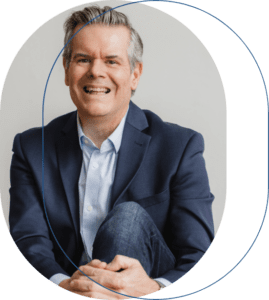You might be wondering what executive coaching can really do for you.
After all, in a world where every problem seems to have a predefined solution, the idea of turning to an executive coach might feel a bit vague, even unnecessary.
But that would be a mistake.
In the relentless whirlwind of your career, taking a moment to truly pause, reflect, and be guided by a professional coach could be the most powerful transformation tool at your disposal.
What is executive coaching?
So, what exactly is executive coaching?
The best metaphor I can think of is that it’s like having a workout partner, but for your career.
Instead of pushing you to lift heavier weights, the coach’s role is to help you take a fresh perspective on your challenges and uncover solutions you wouldn’t have found on your own. It’s like stumbling upon a treasure right when you need it most.
An executive coach isn’t an expert in your field, and that’s actually a good thing. This allows them to bring a fresh, complementary perspective. They act as an objective partner, guiding you to approach situations differently and asking the hard-hitting questions—the ones no one else dares to ask—that take your thinking to the next level for your benefit.
The essence of executive coaching
Executive coaching is a unique relationship built between you and a coach. It’s a partnership based on trust, where the goal isn’t to hand you ready-made answers or change who you are, but to help you uncover your own solutions by addressing aspects you may not have considered.
Unlike a mentor who shares their experience or a consultant who delivers ready-to-use solutions, an executive coach works with you to explore new perspectives, challenge you, and support you in implementing your action plans.

Why consider executive coaching?
To face your challenges with greater ease.
The world of organizations and work is evolving at breakneck speed, and so are the expectations placed on leaders. Executive coaching helps you build emotional agility, resilience, and the ability to innovate and rethink your challenges in this ever-changing context.
Examples of goals discussed in executive coaching
Let me share a few examples of topics often addressed in coaching sessions.
Adapting a directive leadership style in a collaborative culture: You’re leading a team in an environment where everyone has a voice. How do you assert your vision without stifling others? Coaching helps you find that delicate balance.
Maintaining a participative leadership style while delivering results quickly: The opposite is also true. If your style is more participative, how do you ensure democracy doesn’t turn into paralysis, and goals are still met? Once again, coaching holds the key.
Managing workload overload and improving delegation: Overwhelmed by tasks? Learning to delegate effectively is like learning to breathe underwater. Executive coaching shows you how.
Overcoming imposter syndrome: These feelings prevent you from recognizing your own value. Coaching helps you break through those invisible barriers.
Executive coaching goes beyond skill development
But executive coaching is much more than just enhancing professional skills. It’s an inner journey that helps you uncover strengths and abilities you didn’t even know you had.
When we talk about transforming your career, it’s not just about adding skills to your résumé. True, lasting change—the kind that makes a real difference—comes from within. This is where executive coaching truly shines, guiding you through an introspective journey that reveals your full potential.
It’s a process of introspection for a deeper understanding of yourself and how you operate.
Imagine looking into a mirror, but instead of just seeing your reflection, you see who you truly are—your strengths, weaknesses, and, most importantly, your untapped potential.
Executive coaching invites you to this kind of deep introspection. It pushes you to question not only your actions but also your motivations, allowing you to know yourself on a level you’ve never reached before. This self-awareness is key to authentic and impactful leadership.
Enhancing emotional intelligence
Emotions aren’t your enemies. When managed well, they can be a tremendous source of strength. Executive coaching helps you develop emotional intelligence, enabling you to recognize, understand, and harness your emotions and those of others to build stronger relationships and make more informed decisions. It’s an invaluable skill in the professional world, where logic alone isn’t always enough.
Unpacking blockers to disarm underlying fears and doubts
We all have fears, doubts, and blockages. Sometimes they’re so deeply ingrained that we no longer recognize them.
Executive coaching brings these shadows to light, allowing you to confront and ultimately overcome them. It’s like clearing cobwebs out of an old attic—once it’s done, there’s so much more room to build, create, and grow.
Executive coaching is far more than just polishing your professional skills. It’s a journey to the best version of yourself—a more conscious, connected, and fulfilled version. By guiding you through this process of introspection, emotional intelligence enhancement, and demystification of blockers, executive coaching gives you the tools not only to transform your career but also your life.
The process of executive coaching
Executive coaching isn’t a one-size-fits-all solution or a pre-set journey. It’s a personalized voyage, tailored to you, your needs, and your ambitions. Here’s how this journey unfolds, step by step.
Assessing needs and goals
It all begins with a conversation—but not just any conversation. One where you come face-to-face with your aspirations, challenges, and sometimes even truths you’d rather avoid. Together with your coach, you define what you truly want to achieve. Not what others expect of you, but what you, deep down, are striving to accomplish.
Developing a personalized action plan
Once your goals are crystal clear, the real work begins. Your executive coach helps you build an action plan—not a rigid, inflexible roadmap, but a living guide that evolves with you. This plan is your compass for navigating the complex world of your career, complete with concrete steps, milestones, and strategies tailored to your unique situation.
Coaching sessions: frequency and methodology
The heart of executive coaching lies in regular sessions with your coach. Whether in person, via video call, or over the phone, these moments are sacred. They’re your safe space to explore, experiment, and grow. The frequency of these sessions varies based on your needs and pace, but their impact remains consistent: transformational.
Each session is an opportunity to review your progress, recalibrate if needed, and dive even deeper into your personal and professional development. It’s a mix of support and guidance, challenge and discovery, where every conversation takes you a step closer to transformation.
How to choose an executive coach?
Choosing your executive coach is a bit like selecting a travel partner for a life-changing adventure. Here are some key tips to guide you in making this crucial decision.
Trust your intuition
Your first meeting with a potential coach is pivotal. Do you feel a connection? Are you comfortable opening up and being vulnerable? Your intuition is a valuable guide. If something feels off, keep looking.
Experience and specialization
Take a close look at the coach’s background. Does their experience reflect the challenges you want to tackle in your career? Certain specializations may align better with your personal and professional goals. A great coach has a rich, diverse background and can adapt to your unique context.
Methodology and approach
Every coach has their own methodology. Some focus on pragmatic action plans, while others emphasize personal growth, emotional management, or relational intelligence. Make sure their approach resonates with your vision of coaching and your expectations.
Feedback and testimonials
The experiences of other clients can provide valuable insights into the coach’s style and the results they deliver. Don’t skip this step. Testimonials often reveal aspects of coaching that aren’t immediately obvious during initial discussions.
Conclusion
Executive coaching isn’t just an investment in your career—it’s an investment in the person you want to become. It’s a journey toward deeper self-understanding, excellence in your performance and professional practice, and a more balanced and fulfilling life.
If you feel at a crossroads, if you’re looking to unlock your highest potential or simply breathe new life into your career, executive coaching might just be the answer. With the right coach by your side, every challenge becomes an opportunity, every obstacle a step closer to your most accomplished self.


0 Comments